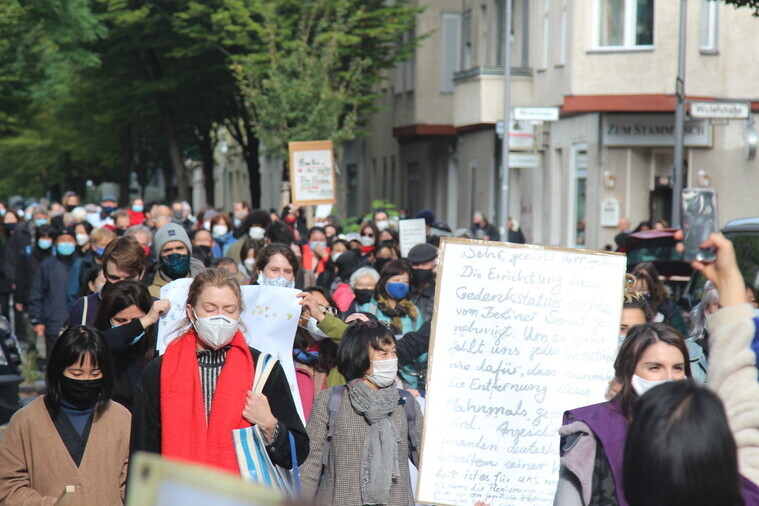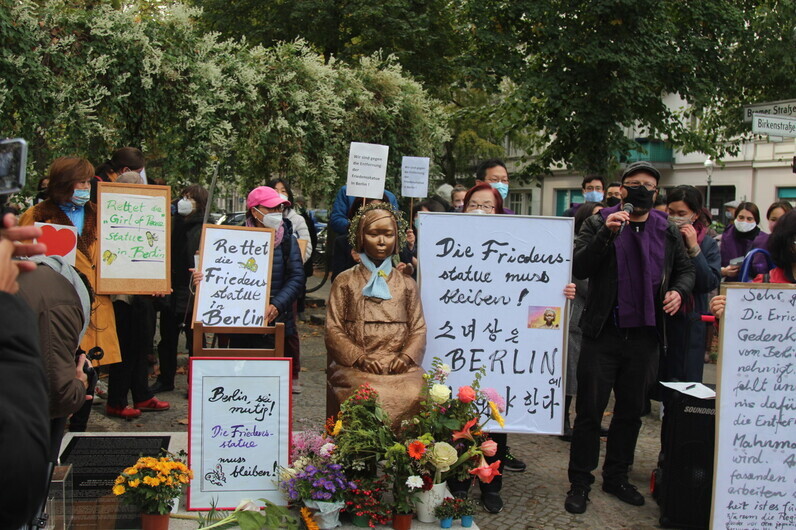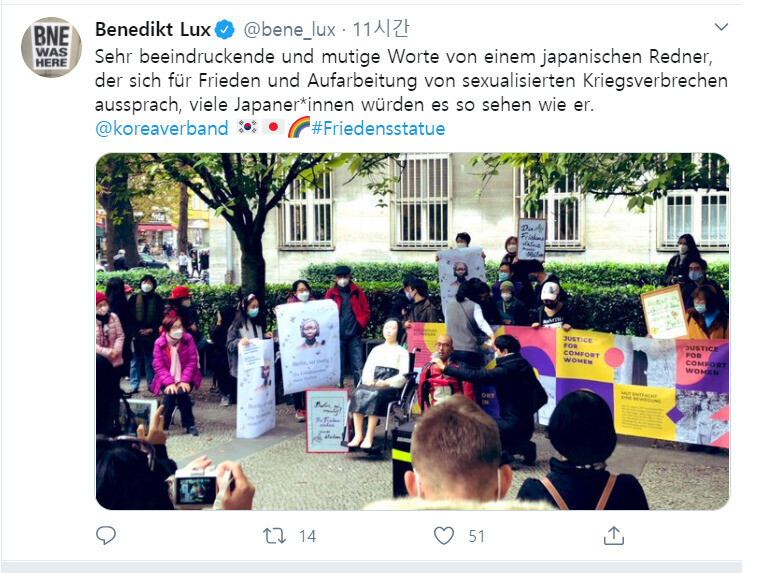hankyoreh
Links to other country sites 다른 나라 사이트 링크
Berlin citizens say removal of comfort woman statue is suppression of freedom of expression

“We plan to go back to square one in examining all of the arguments from related activists on this complex issue [while an administrative course decides whether to suspend an order for the removal of a statue commemorating the comfort women].”
Stephan von Dassel, the mayor of Berlin’s Mitte borough who issued an order on Oct. 7 for the removal of a statue commemorating victims of military sexual slavery, shared his willingness to compromise during an unscheduled discussion at a demonstration in Berlin at 2 pm on Oct. 13 to protest the statue’s removal. In his message, he proposed working toward a solution amid the removal’s postponement due to an application by the German-Korean civic group Korea Verband for an injunction to suspend the removal order. After von Dassel’s remarks, the atmosphere at the demonstration instantly took on a festive quality.
“Hopefully, there is a compromise that both South Korea and Japan can be satisfied with,” he explained while elaborating what he meant by “examining” arguments. With Mitte explaining at the time of its removal order on Oct. 7 that it took issue with an inscription reading, “During the Second World War II, the Japanese military forcibly seized women as sexual slaves from throughout the Asia-Pacific region,” some observers are predicting a compromise could be sought through a revision to that inscription.
“It looks as though the inscription is going to be a major issue,” said Nataly Jung-Hwa Han, director of Korea Verband, adding that revisions to some of the wording may be considered for the sake of having the removal decision reversed.
While the negotiation process is not expected to be entirely smooth sailing, the situation does appear to have helped establish support for the statue within Germany’s Green Party and elsewhere. In Glendale, California, the decision was made to preserve a similar statue with the help of the mayor and city government, despite attempts at pressure from a Japanese far-right group.

A crucial factor in the reversal of Mitte’s position from removing the statue to reconsidering its plans was a strategy of persuasion by civic groups, who approached the statue issue as one of universal human rights -- including wartime sexual violence and freedom of expression -- rather than as a diplomatic issue between South Korea and Japan or a matter of anti-Japanese nationalism. According to reports by German news outlets, public opinion within the constituency and Berlin city council shifted rapidly toward reconsidering the removal after it was determined that Japanese pressure to have the statue taken down constituted “suppression of freedom of expression.”
On Oct. 12, the day before the demonstration, the Mitte borough regional committee of the Social Democratic Party made a majority decision proposing open discussions on reconsidering the decision to remove the statue. Shortly before the demonstration on Oct. 13, the Berlin branch of the Green Party issued a stern criticism of the decision by von Dassel -- a member of the party -- to have the statue taken down. Appearing in an interview with a Berlin-Brandenburg radio station, Laura Neugebauer, a spokesperson for a group of Green Party-affiliated city council members, said, “Mayor von Dassel’s decision falsely communicated the values of the Green Party.”
“The Green Party supports artistic freedom and sides with victims of forced sexual labor,” she stressed, calling for renewed permission for the statue to remain. Some of the Green Party city council members even participated in the demonstration themselves.

A major factor in the Berlin city coalition between the Green Party and Social Democratic Party coming out in support of the comfort woman statue was the growing perception of the statue as a symbol of crimes of wartime sexual violence. Since the process of its raising, the thematic focus behind the Berlin statue has been on opposition to war and sexual violence rather than anti-Japan sentiments, with participation from women’s rights groups, minority populations, and even Japanese women.
In a press conference ahead of the demonstration on Oct. 13, Hiroko Zerdrik Nojin and two other Japanese women expressed their outrage at the Japanese government’s actions in attempting to sabotage the statue’s establishment. Makoto Takita, a 50-year-old Japanese resident of Berlin, kneeled before the statue the same day to share an “apology to the victims of sexual crimes by the Japanese military.” In an interview with the Hankyoreh, he said, “It became too difficult for me not to apologize due to my enormous feelings of guilt toward victims of the Japanese military, not just in Korea but in other countries.”
With the statue’s reprieve a day ahead of its Oct. 14 removal deadline, it has received growing attention from the German press. In their online editions, national newspapers such as the Süddeutsche Zeitung and Die Welt published a local news piece under the title “Decision to keep comfort woman statue for now.” The Berlin city website provided information about the demonstrations against the statue’s removal in its city government news section, along with a detailed explanation about previous cases in Germany where the placement of comfort women statues ran into opposition from Japan.
Several local news outlets in Berlin treated the demonstration as a major story that day, with references to a “monument war” in the titles of their pieces. The Berliner Zeitung wrote, “While debates have raged in Berlin over the removal of monuments to perpetrators of violence such as statues of Otto von Bismarck, this has been the rare debate that involves an attempt to remove a monument to victims.”
“We are looking to see what decision the administrative court makes on this situation in terms of freedom of expression,” it added.
By Nam Eun-joo, Berlin correspondent
Please direct comments or questions to [english@hani.co.kr]

Editorial・opinion
![[Column] The state is back — but is it in business? [Column] The state is back — but is it in business?](https://flexible.img.hani.co.kr/flexible/normal/500/300/imgdb/original/2024/0506/8217149564092725.jpg) [Column] The state is back — but is it in business?
[Column] The state is back — but is it in business?![[Column] Life on our Trisolaris [Column] Life on our Trisolaris](https://flexible.img.hani.co.kr/flexible/normal/500/300/imgdb/original/2024/0505/4817148682278544.jpg) [Column] Life on our Trisolaris
[Column] Life on our Trisolaris- [Editorial] Penalties for airing allegations against Korea’s first lady endanger free press
- [Editorial] Yoon must halt procurement of SM-3 interceptor missiles
- [Guest essay] Maybe Korea’s rapid population decline is an opportunity, not a crisis
- [Column] Can Yoon steer diplomacy with Russia, China back on track?
- [Column] Season 2 of special prosecutor probe may be coming to Korea soon
- [Column] Park Geun-hye déjà vu in Yoon Suk-yeol
- [Editorial] New weight of N. Korea’s nuclear threats makes dialogue all the more urgent
- [Guest essay] The real reason Korea’s new right wants to dub Rhee a founding father
Most viewed articles
- 1Amid US-China clash, Korea must remember its failures in the 19th century, advises scholar
- 2[Column] Why Korea’s hard right is fated to lose
- 3[Column] The state is back — but is it in business?
- 4Trump’s talk of flouting NATO promises sparks apprehension in Seoul
- 560% of young Koreans see no need to have kids after marriage
- 6New sex-ed guidelines forbid teaching about homosexuality
- 7Presidential office warns of veto in response to opposition passing special counsel probe act
- 8[Column] Can Yoon steer diplomacy with Russia, China back on track?
- 9[Guest essay] Maybe Korea’s rapid population decline is an opportunity, not a crisis
- 10[Reporter’s notebook] In Min’s world, she’s the artist — and NewJeans is her art